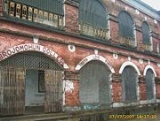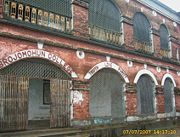
Brajamohan College
Encyclopedia

Bangladesh
Bangladesh , officially the People's Republic of Bangladesh is a sovereign state located in South Asia. It is bordered by India on all sides except for a small border with Burma to the far southeast and by the Bay of Bengal to the south...
. It is located in the town of Barisal in South-Western Bangladesh.
History
Though Barisal was called the "Venice of the East" and "Crop House of Bengal", the town's education sector was not strong, as it was geographically far from both DhakaDhaka
Dhaka is the capital of Bangladesh and the principal city of Dhaka Division. Dhaka is a megacity and one of the major cities of South Asia. Located on the banks of the Buriganga River, Dhaka, along with its metropolitan area, had a population of over 15 million in 2010, making it the largest city...
and Calcutta. Barisal Zilla School
Barisal Zilla School
Barisal Zilla School is a boys school located in Barisal, Bangladesh. One of the oldest schools in Bangladesh, it has more than two thousand students. Beside the school playground, Barisal Zilla School owns famous ground called Poreshagor. The school celebrated its 175th anniversary on 9-10...
was established in 1854, but the school was not large enough to serve the rapidly growing numbers of students. To solve the problem, Mahatma Ashwini Kumar Dutta started a new school in 1884. As there was no facility of higher education, the district magistrate at that time, Ramesh Chandra Dutta
Romesh Chunder Dutt
Romesh Chunder Dutt, CIE was an Indian civil servant, economic historian, writer, and translator of Ramayana and Mahabharata.- Formative years :...
, requested Mahatma Ashwini Kumar Dutta to establish a college. On June 14, 1889, Aswini Kumar Dutta founded Brojo Mohan College.
The first principal of the college was Babu Gyan Chandra Chowdhury. While Ashwini Kumar Dutta
Ashwini Kumar Dutta
Ashwini Kumar Dutta was an Indian educationist, philanthropist, social reformer and patriot.- Early life :...
taught English and Logic, Kali Prasanna Ghosh taught History and Kamini Kumar BidyaRatna taught Sanskrit
Sanskrit
Sanskrit , is a historical Indo-Aryan language and the primary liturgical language of Hinduism, Jainism and Buddhism.Buddhism: besides Pali, see Buddhist Hybrid Sanskrit Today, it is listed as one of the 22 scheduled languages of India and is an official language of the state of Uttarakhand...
and Bengali
Bengali language
Bengali or Bangla is an eastern Indo-Aryan language. It is native to the region of eastern South Asia known as Bengal, which comprises present day Bangladesh, the Indian state of West Bengal, and parts of the Indian states of Tripura and Assam. It is written with the Bengali script...
. In 1898, BM College was transformed into a "First Grade College" from a "Second Grade College". In 1912, the college went to the Govt. management
Management
Management in all business and organizational activities is the act of getting people together to accomplish desired goals and objectives using available resources efficiently and effectively...
from personal management strategy. From 1889 to 1917 the regular activities of the college took place in BM School campus. The college was relocated to its own present complex in 1917.
From the very beginning the college was so dynamic and the results were very good. The teachers of that time were skilled, so Calcutta University started an Honors course in English
English language
English is a West Germanic language that arose in the Anglo-Saxon kingdoms of England and spread into what was to become south-east Scotland under the influence of the Anglian medieval kingdom of Northumbria...
and Philosophy
Philosophy
Philosophy is the study of general and fundamental problems, such as those connected with existence, knowledge, values, reason, mind, and language. Philosophy is distinguished from other ways of addressing such problems by its critical, generally systematic approach and its reliance on rational...
in 1922, Sanskrit and Mathematics
Mathematics
Mathematics is the study of quantity, space, structure, and change. Mathematicians seek out patterns and formulate new conjectures. Mathematicians resolve the truth or falsity of conjectures by mathematical proofs, which are arguments sufficient to convince other mathematicians of their validity...
in 1925, Chemistry
Chemistry
Chemistry is the science of matter, especially its chemical reactions, but also its composition, structure and properties. Chemistry is concerned with atoms and their interactions with other atoms, and particularly with the properties of chemical bonds....
in 1928, and Economics
Economics
Economics is the social science that analyzes the production, distribution, and consumption of goods and services. The term economics comes from the Ancient Greek from + , hence "rules of the house"...
in 1929. In 1928, Shirimoti Shanti Sudha Ghosh stood First class First in Honors in Mathematics from Calcutta University.
The time from 1922 to 1948 is called the "Golden Period" of the college. The governor of Bengal at that time, Sir Udbarn, once commented on BM College, "The college promises some day to challenge the supremacy
Supremacy
Supremacy may refer to:* Supremacism, a philosophy that one is superior to others, so dominate, control or rule those who are not* Acts of Supremacy, 16th century laws in England concerning King Henry VIII and the church...
of the metropolitan (Presidency
Presidency
The word presidency is often used to describe the administration or the executive, the collective administrative and governmental entity that exists around an office of president of a state or nation...
) College."
Due to the partition of India and Pakistan in 1947, the college lacked teachers and the student body fell to one third of its post-war size. This made it difficult to teach the same numbers of courses and as a result the two year Honors curriculum conducted by Calcutta University was replaced with the three Honors curriculum of Dhaka University. As a consequence, Honors courses except Mathematics were abolished in 1950. In 1952, Honors in Mathematics had also been eradicated. During the 1964-65 session, Honors in Economics restarted. Several other Honors and Masters Courses of various subjects started between 1972 to the 2005-06 sessions.
The time since 1965 has been called the "Age of Enrichment" of the college. Former principal Prof. Mohammad Hanif is called the "Architect of Modern Brojo Mohun College". There are currently 20 degree (pass) courses, 18 Honors courses and 19 Masters courses at BM College. H.S.C. course have been abolished since 1999.
The poet Jibanananda Das
Jibanananda Das
Jibanananda Das was a noted Bengali poet. He is considered one of the precursors who introduced modernist poetry to Bengali Literature, at a period when it was influenced by Rabindranath Tagore's Romantic poetry....
taught at BM College.
Notable alumni
The list of alumni includes- Bir Sreshtho Mohiuddin JahangirMohiuddin JahangirMohiuddin Jahangir was a Captain in the Bangladesh Army during the 1971 Liberation War. He was born in 1948 in the village of Rahimgonj under Babugonj upazilla of Barisal district. He was an officer in Sector 7 of the Muktibahini. He was killed in an attempt to break through enemy defences on the...
, awarded the highest recognition of bravery in the Bangladesh Army - Jibanananda DasJibanananda DasJibanananda Das was a noted Bengali poet. He is considered one of the precursors who introduced modernist poetry to Bengali Literature, at a period when it was influenced by Rabindranath Tagore's Romantic poetry....
, famous Poet - Altaf MahmudAltaf MahmudAltaf Mahmud was a musician, cultural activist and martyred freedom fighter of the Bangladesh Liberation War...
, musician, cultural activist and martyred freedom fighter - Narayan GangopadhyayNarayan GangopadhyayNarayan Gangopadhyay ,Narayan Gangopadhyay (1918–1970),Narayan Gangopadhyay (1918–1970),(also known as Narayan Ganguly was a renowned South Asian author. He was born in Dinajpur in undivided Bengal, in what is now Bangladesh. His real name was Taraknath Gangopadhyay.-Life:...
, renowned South Asian author - Dr. Swadesh BoseSwadesh BoseDr Swadesh Bose was a renowned Bangladeshi economist and organiser of the Liberation War. Born at Kashipur in Barisal, Swadesh Bose was a member of the planning cell of the Mujibnagar government during the Liberation War...
, renowned Bangladeshi economist and organiser of the Liberation War
Notable faculty members
The list of notable faculty includes- Babu Gyan Chandra Chowdhury, founder principal of the college
- Aswini Kumar Dutta, founder and taught English and Logic
- Kali Prasanna Ghosh, taught History
- Kamini Kumar BidyaRatna, taught Sanskrit and Bengali
- Jibanananda DasJibanananda DasJibanananda Das was a noted Bengali poet. He is considered one of the precursors who introduced modernist poetry to Bengali Literature, at a period when it was influenced by Rabindranath Tagore's Romantic poetry....
, famous Poet - Prof. Mohammad Hanif, architect of Modern Brojomohun College
- Prof. Sarat Chandra Gupta, Successor to Achaya B. N. Seal to become the Principal of the Prestigious Victoria College in the then state of Kochbehar
- Prof. Amulya Ratan Gupta, Dept. of English in the Prestigious Victoria College in the then state of Kochbehar

